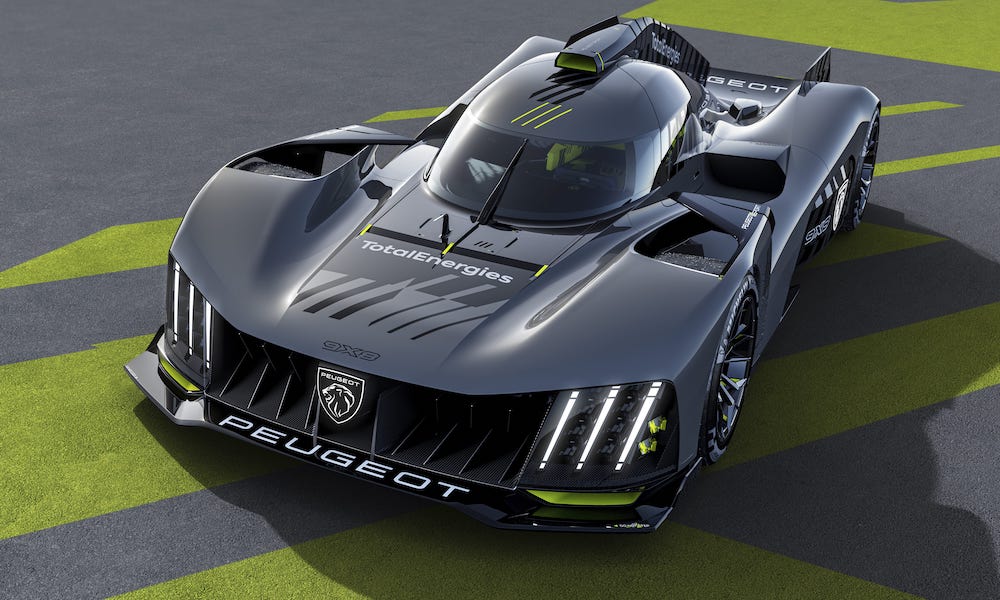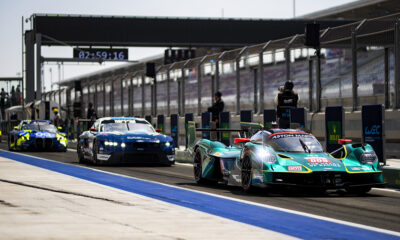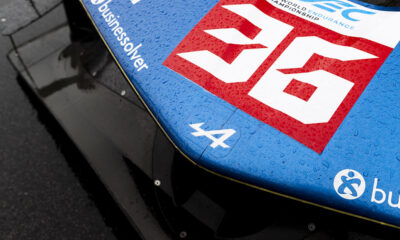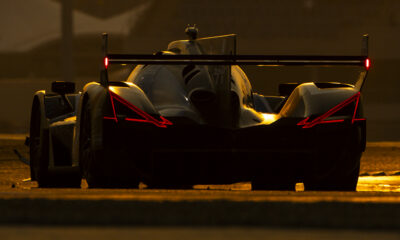Peugeot has unveiled its ‘9X8’ hybrid-powered Le Mans Hypercar that will compete in the FIA World Endurance Championship and the 24 Hours of Le Mans from next year.
The French manufacturer revealed its hybrid-powered sports prototype on Tuesday, in a presentation at its motorsport headquarters at Versailles-Satory.
The Peugeot 9X8 takes the ‘900’ naming structure used for past Peugeot endurance racing machines, while the ‘X’ part represents the LMH car’s all-wheel-drive technology and hybrid powertrain. The ‘8’ element stems from Peugeot’s current road car products.
The most striking feature of the 9X8 is the absence of a rear wing. According to Peugeot, the “greater flexibility” allowed by the LMH technical regulations in terms of aerodynamics enabled the company to “permit radical new thinking” in the car’s design.
Peugeot’s WEC technical director Olivier Jansonnie worked with a team led by Peugeot Sport Design Director Matthias Hossann to establish the car’s aerodynamic profile.
“The new Le Mans Hypercar regulations were drawn up to level out the importance of conventional performance-boosting systems,” Jansonnie explained.
“Designing the 9X8 has been a passionate experience because we had the freedom to invent, innovate and explore off-the-wall ways to optimize the car’s performance, and more especially its aerodynamics.
“The regulations stipulate that only one adjustable aerodynamic device is permitted, without specifying the rear wing. Our calculation work and simulations revealed that high performance was effectively possible without one.”
Peugeot says that removing the rear wing “provided the freedom to design the sort of sleek silhouette that hasn’t been seen for decades.” The car’s rear section includes a large diffuser, above which the term ‘we don’t need a rear wing’ has been etched.
Other 9X8 design elements include triangular aero features housing the wing mirrors, an aggressive front end and lights that reflect Peugeot’s three-claw stroke branding.
“Since the 9X8 is a Peugeot, the original sketch that steered our work portrayed a big cat ready to pounce, a stance which we have suggested by the slightly forward-tilting cockpit,” said Hossann.
“The overall lines of the Peugeot 9X8 express the brand’s styling cues, while its sleek, racy, elegant forms inspire emotion and dynamism.”
Peugeot announced its return to top-level endurance racing in November 2019 and confirmed that it would build a car to the LMH regulations at Le Mans last September.
Since then, the company has pushed on with developing the 9X8. In the early months of this year, it brought each of its seven drivers toSatory for simulator test sessions.
Kevin Magnussen, Loic Duval, Gustavo Menezes, Mikkel Jensen, Jean-Eric Vergne and Paul di Resta are the six full-season drivers, while James Rossiter is on reserve and development duties. A pair of Peugeot 9X8s will compete in the WEC in 2022.
Dyno testing of the vehicle’s 500 kW twin-turbo 2.6-liter V6 internal combustion engine started in April. The 200 kW electric motor is currently in the assembly stage.
“Our target with regard to our energy requirements is flawless reliability and perfect control,” said Jean-Marc Finot, head of Stellantis Motorsport.
“Le Mans has become a 24-hour sprint race that can be won or lost by the number of times you pit. The exceptional energy efficiency of the new Hypercars prefigures what we will see shortly in the world of road cars.
“This consideration had a fundamental influence on our work on the Peugeot 9X8 package, every aspect of which needs to contribute to achieving hyper-efficiency, from its powertrain to its aerodynamics.”
Peugeot CEO Linda Jackson commented: “I know the teams at Peugeot Design and Peugeot Sport and they always produce quality, innovative work, but I have to admit to being blown away by the 9X8.
“It is simply magnificent. The way its innovative, flowing lines exude such a powerful brand identity is masterful.”


























